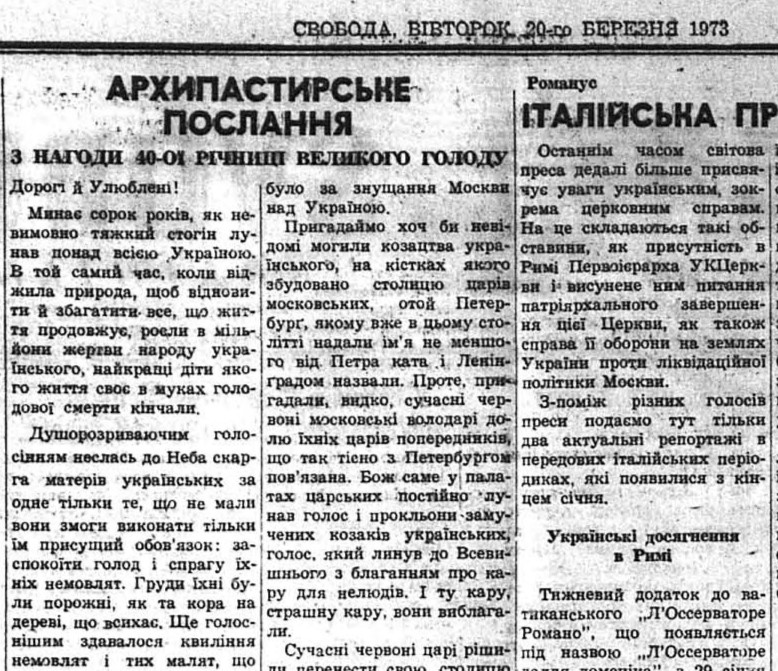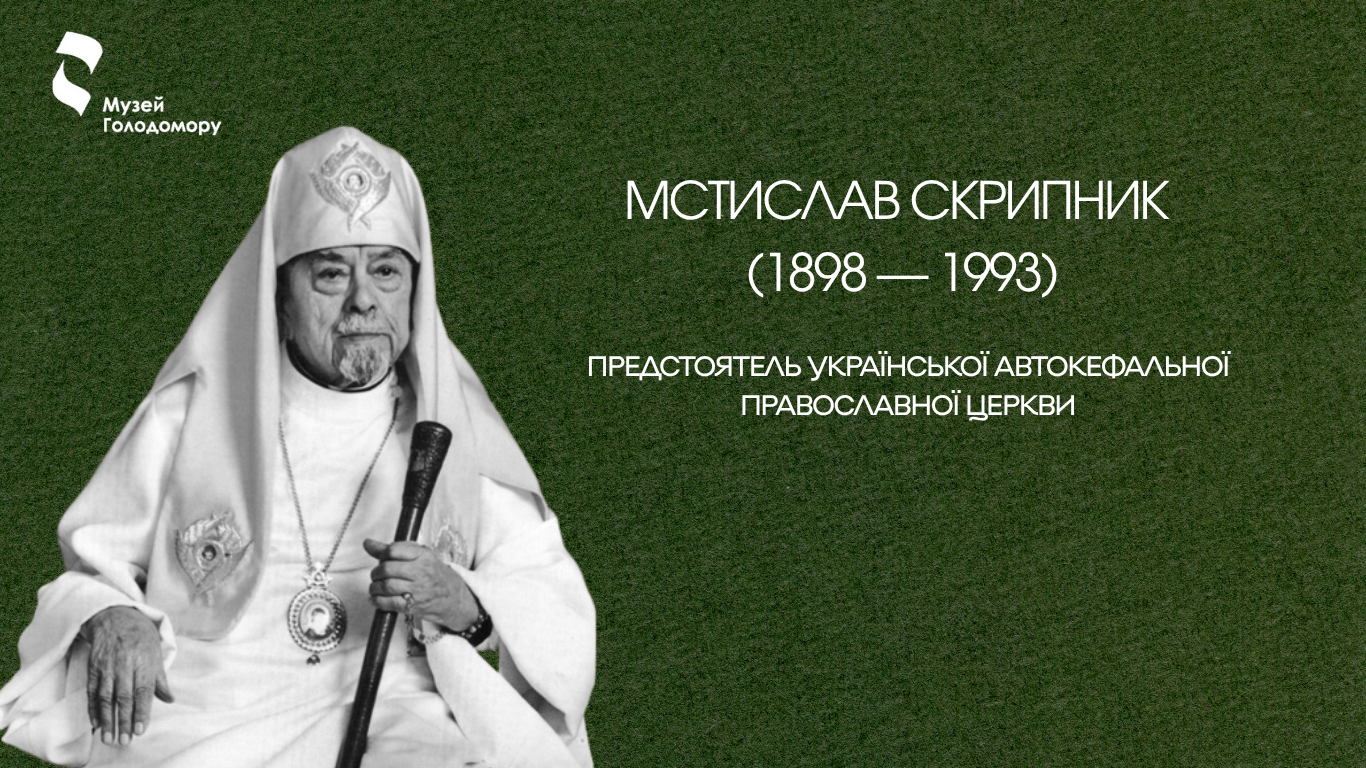Archpastoral message from Mstyslav (Skrypnyk) on the occasion of the 40th anniversary of the Great Famine
Dear and Beloved!
Forty years have passed since an indescribably heavy groan echoed across Ukraine. While nature was reviving to restore and enrich everything that life continues, millions of Ukrainian people were dying, the best of whom ended their lives in the agony of starvation.
The heart-rending cries of Ukrainian mothers rose to Heaven, complaining only that they were unable to fulfil their natural duty: to satisfy the hunger and thirst of their babies. Their breasts were empty, like the bark of a drying tree. Even louder seemed the cries of infants and toddlers who had already begun to walk… Countless communal and makeshift graves grew, mostly outside villages shrouded in black mourning, dug by the roads, in ravines or the middle of open fields…

It was in the spring of 1933 that another Holy Week was coming to an end, which misanthropic Moscow had once again imposed on Ukraine, deliberately shortening the lives of the best children of the Ukrainian people. And all this at a time when it had more than enough of the wealth that it had seized from Ukrainian land by force…
This year, we remember a truly difficult and painful fortieth anniversary. Let us understand the Great Famine as God’s most difficult test, through which the Lord tested our people in order to grant them a better future, so that Ukrainian mothers would no longer worry about the fate of their infants and children, and so that their children would grow up in freedom, to the glory of God, to the joy of their relatives, for the good of Mother Ukraine, and for the inspiration of all humanity to fight against the forces of EVIL and for the Truth of Christ on earth.
The crime committed by Moscow was extremely cruel, so brutal and inhuman that it shook Moscow itself. It still feels the shock in its dungeons, more uncertain about tomorrow than ever before. The shock caused by the Great Famine was much stronger for Moscow than those it had experienced before, inflicting pain and humiliation on our people more than once. It is aware of this, and therefore seeks salvation in even greater crimes against the Ukrainian people, tearing children away from their relatives and distorting their souls in separation, all with one goal: that Ukrainian children forget whose children they are, from what blood and bones and from what glorious family and tribe they come…
Christ taught that those who despise children will face the most severe punishment. This punishment awaits Moscow. It will inevitably come, as it has many times before for Moscow’s abuse of Ukraine.
Let us recall at least the unknown graves of the Ukrainian Cossacks, on whose bones the capital of the Moscow tsars was built, that St. Petersburg, which in this century was given a name no less than Peter the executioner and called Leningrad. However, it seems that the modern red rulers of Moscow remembered the fate of their tsarist predecessors, which is so closely connected with St. Petersburg. In the tsarist chambers, the voices and curses of the tortured Ukrainian Cossacks constantly echoed, voices that rose to the Almighty, pleading for punishment for the inhumane. And they obtained that punishment with a beg, a terrible punishment.
The modern red tsars decided to move their capital back to ‘red-stone’ Moscow, perhaps in the hope that they too would be able to conceal in Moscow’s dungeons and basements all the crimes committed against individuals and peoples, from Tsar Ivan the Terrible to the bloody Tsar Stalin. But it is futile, as Ukrainian graves know how to speak with the winds and call for the completion of the unfinished. The voice from those graves, and those scattered by Moscow across the vast expanses of its North, and those buried in mass graves in the Siberian taiga and subarctic tundra, and those who ended their lives in the mines and quarries of Kamchatka and on the sands of Kazakhstan, and those who grew up all over Ukraine at Moscow’s behest, and, finally, especially from the graves of the victims of the Great Famine — is becoming ever more powerful. The time for punishment is no longer behind us. The last clouds, red with spilt Ukrainian blood and salty with the tears of Ukrainian mothers, are already fading beyond the horizon. The sunrise of freedom is already visible.
Let us pray, brothers and sisters, that the warmth of the long-awaited sun will warm the Ukrainian land, desecrated by human malice, and hasten the dawn of freedom upon it. However, let us remember at the same time that prayer must be accompanied by hard work, because faith in God’s justice is only effective and victorious when it is creatively reinforced by action. Let us strengthen our faith in God’s justice, each in ourselves and all together within our devout Ukrainian community. May God grant us success in this!
At the same time, I call upon you, dear and beloved ones, to bow your heads in reverence before the graves of the martyrs of the Great Famine on its fortieth anniversary and to honour their memory with fervent prayers for their souls. I designate this year’s Thomas Sunday, the Sunday on which our Holy Church has prayed for the souls of our glorious predecessors and righteous people, martyrs and heroes of Ukraine for centuries, as the day of national commemoration of the victims and martyrs of the Great Famine.
May this year’s Thomas Sunday be filled with fervent prayers for the repose of souls in all Ukrainian churches throughout the free world, wherever we are united in Christ, and especially in the temples of the strongest bastion of our nation, the Ukrainian Autocephalous Orthodox Church!
I mark the main mourning ceremonies on the 40th anniversary of the Great Famine will serve as the centre of Ukrainian Orthodoxy outside the homeland, at St. Andrew’s House in Bound Brook, New Jersey, USA, where on Thomas Sunday, 6 May, a solemn national memorial service will be held at the cemetery of the Memorial Church.
Yours in Christ, Mstyslav, Metropolitan of the Ukrainian Autocephalous Orthodox Church
Published in the newspaper Svoboda on 20 March 1973.
